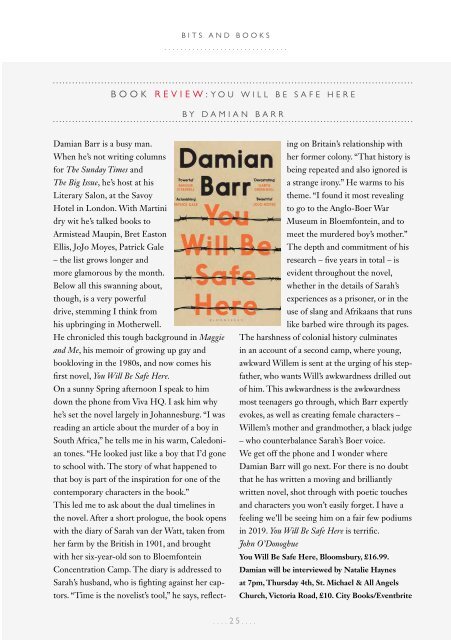Viva Brighton Issue #74 April 2019
Create successful ePaper yourself
Turn your PDF publications into a flip-book with our unique Google optimized e-Paper software.
BITS AND BOOKS<br />
...............................<br />
BOOK REVIEW: YOU WILL BE SAFE HERE<br />
BY DAMIAN BARR<br />
Damian Barr is a busy man.<br />
When he’s not writing columns<br />
for The Sunday Times and<br />
The Big <strong>Issue</strong>, he’s host at his<br />
Literary Salon, at the Savoy<br />
Hotel in London. With Martini<br />
dry wit he’s talked books to<br />
Armistead Maupin, Bret Easton<br />
Ellis, JoJo Moyes, Patrick Gale<br />
– the list grows longer and<br />
more glamorous by the month.<br />
Below all this swanning about,<br />
though, is a very powerful<br />
drive, stemming I think from<br />
his upbringing in Motherwell.<br />
He chronicled this tough background in Maggie<br />
and Me, his memoir of growing up gay and<br />
bookloving in the 1980s, and now comes his<br />
first novel, You Will Be Safe Here.<br />
On a sunny Spring afternoon I speak to him<br />
down the phone from <strong>Viva</strong> HQ. I ask him why<br />
he’s set the novel largely in Johannesburg. “I was<br />
reading an article about the murder of a boy in<br />
South Africa,” he tells me in his warm, Caledonian<br />
tones. “He looked just like a boy that I’d gone<br />
to school with. The story of what happened to<br />
that boy is part of the inspiration for one of the<br />
contemporary characters in the book.”<br />
This led me to ask about the dual timelines in<br />
the novel. After a short prologue, the book opens<br />
with the diary of Sarah van der Watt, taken from<br />
her farm by the British in 1901, and brought<br />
with her six-year-old son to Bloemfontein<br />
Concentration Camp. The diary is addressed to<br />
Sarah’s husband, who is fighting against her captors.<br />
“Time is the novelist’s tool,” he says, reflecting<br />
on Britain’s relationship with<br />
her former colony. “That history is<br />
being repeated and also ignored is<br />
a strange irony.” He warms to his<br />
theme. “I found it most revealing<br />
to go to the Anglo-Boer War<br />
Museum in Bloemfontein, and to<br />
meet the murdered boy’s mother.”<br />
The depth and commitment of his<br />
research – five years in total – is<br />
evident throughout the novel,<br />
whether in the details of Sarah’s<br />
experiences as a prisoner, or in the<br />
use of slang and Afrikaans that runs<br />
like barbed wire through its pages.<br />
The harshness of colonial history culminates<br />
in an account of a second camp, where young,<br />
awkward Willem is sent at the urging of his stepfather,<br />
who wants Will’s awkwardness drilled out<br />
of him. This awkwardness is the awkwardness<br />
most teenagers go through, which Barr expertly<br />
evokes, as well as creating female characters –<br />
Willem’s mother and grandmother, a black judge<br />
– who counterbalance Sarah’s Boer voice.<br />
We get off the phone and I wonder where<br />
Damian Barr will go next. For there is no doubt<br />
that he has written a moving and brilliantly<br />
written novel, shot through with poetic touches<br />
and characters you won’t easily forget. I have a<br />
feeling we’ll be seeing him on a fair few podiums<br />
in <strong>2019</strong>. You Will Be Safe Here is terrific.<br />
John O’Donoghue<br />
You Will Be Safe Here, Bloomsbury, £16.99.<br />
Damian will be interviewed by Natalie Haynes<br />
at 7pm, Thursday 4th, St. Michael & All Angels<br />
Church, Victoria Road, £10. City Books/Eventbrite<br />
....25....


















